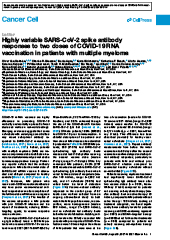
COVID-19 mRNA vaccines are highly
efficacious in preventing COVID-19
morbidity and mortality in phase 3 clinical
studies as well as in real-world settings.
Emerging evidence suggests that some
individuals with underlying comorbidities
may mount suboptimal antibody responses to SARS-CoV-2 immunization
(Addeo et al., 2021; Monin et al., 2021;
Thakkar et al., 2021). Indeed, patients
with multiple myeloma (MM) are immuno-compromised due to defects in humoral and cellular immunity as well as due
to immunosuppressive therapy. Preliminary reports indicate that the antibody
response in MM after the initial dose of
SARS-CoV-2 mRNA vaccine is attenuated and delayed compared to healthy
controls (Bird et al., 2021; Terpos et al.,
2021). Moreover, MM patients who
receive anti-CD38 monoclonal antibodies
may have poorer vaccine-induced antibody responses even after completion of
the full two-dose mRNA vaccine regimen
(Pimpinelli et al., 2021). The kinetics of
the vaccine responses in MM patients
with prior COVID-19 infection and the
impact of treatments, including BCMAtargeting agents, to vaccine response
remain unknown.


